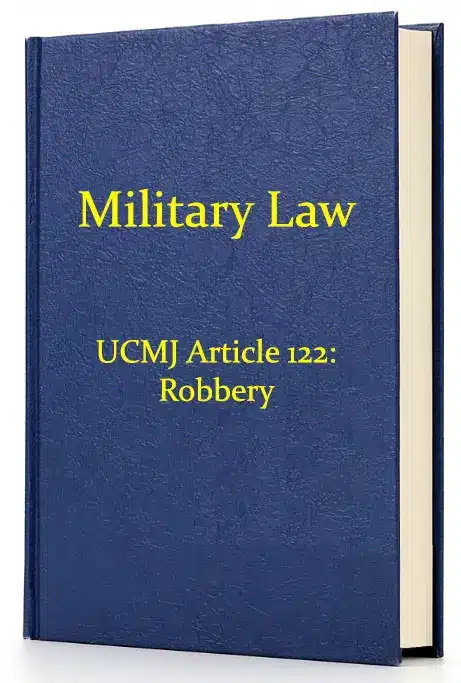The Manual for Courts-Martial states any service member who takes “anything of value from the person or in the presence of another, against his will, using force or violence or fear of immediate or future injury to his person or property or to the person or property of a relative or member of his family or anyone in his company at the time of the robbery, is guilty of robbery” and shall be subject to prosecution.
To be prosecuted for a violation of Article 122, it must be established that the following:
-
the accused wrongfully took specific property from the person or the possession and in the presence of a person named or described;
-
the taking was against the will of that person;
-
the taking was using force, violence, or force and violence, or putting the person in fear of immediate or future injury to that person, a relative, a member of the person’s family, anyone accompanying the person at the time of the robbery, the person’s property, or the property of a relative, family member, or anyone attending the person at the time of the theft;
-
the property belonged to a person named or described and
-
the property was of a certain or some value.
If the robbery was committed with the use of a dangerous weapon, the means of force or violence or of putting the person in fear of a dangerous weapon must also be established.
Understanding Article 122 (Robbery) of the UCMJ
For a robbery to have been committed, the property doesn’t need to be located within a certain distance of the victim.
For a robbery to be committed by force or violence, there must be actual force or violence to the person preceding or accompanying the taking against the person’s will, and it is immaterial that there is no fear engendered in the victim. Any amount of force is enough to constitute robbery if the force overcomes the actual resistance of the person robbed, puts the person in such a position that no resistance is made, or suffices to overcome the resistance offered by a chain or other fastening by which the article is attached to the person. The offense is not robbery if an article is merely snatched from the hand of another or a pocket is picked by stealth, no other force is used, and the owner is not put in fear.
For a robbery to be committed by putting the victim in fear, there need be no actual force or violence. Still, there must be a demonstration of force or menace by which the victim is placed in such fear that the victim is warranted in making no resistance. The fear must be a reasonable apprehension of present or future injury, and the taking must occur while the apprehension exists. The injury apprehended may be death or bodily injury to the person or a relative or family member, or anyone in the person’s company at the time, or it may be the destruction of the person’s habitation or other property or that of a relative or family member or anyone in the person’s company at the time of sufficient gravity to warrant giving up the property demanded by the assailant.
Robberies of different persons at the same time and place are separate offenses, and each such robbery should be alleged in a particular specification.
Maximum Possible Punishment for Violations of Article 122
Service members convicted of violating Article 122 would face the maximum possible punishment of a dishonorable discharge, forfeiture of all pay and allowances, and confinement for 15 years if the robbery was committed with a dangerous weapon. In all other robbery cases, the maximum possible punishment is a dishonorable discharge, forfeiture of all pay and allowances, and confinement for ten years.
How do you defend against Article 122 Robbery charges?
When facing the combined military resources and the current cultural climate, you must be prepared to defend your career and freedom. Crisp and Associates, LLC has a team of experienced trial attorneys with over 75 years of combined experience who have won these cases. This team includes the firm’s founder, Jonathan Crisp, a highly respected and sought-after attorney, speaker, and lecturer who has served in the U.S. Army Judge Advocate General’s Corps (JAG) since 1998 and entered private practice in 2007.
If you, or someone you know, is facing Article 122 charges for Robbery, you need to speak with a Military defense attorney immediately. We understand what is at risk and learn how to protect your career, freedom, and future.


